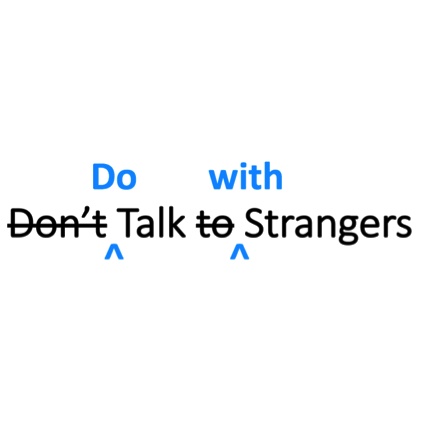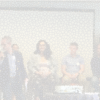[vc_row][vc_column][vc_column_text]On the one hand, talking to strangers makes us vulnerable. On the other, it invites a new connection that demonstrates respect and honors the dignity of everyone we encounter.
Don’t talk to strangers! That’s what we’re taught as kids. It’s reasonable guidance for safety and self-preservation. But think about the worldview it reflects: it implies that everyone you don’t know is out to get you. And they are. (Sorry, my periodically paranoid side momentarily commandeered the keyboard.)
Yet, talking with—and more importantly, listening to—strangers is what I do for a living…and one of the things that I live to do.
 I’m not naïve. There are some very bad hombres out there. The stranger in your midst may be one of them. However, I am convinced that the vast majority of people are well-intentioned and guided by an inherent sense of decency. Anne Frank wrote, “I keep my ideals because, in spite of everything, I still believe that people are really good at heart.” Her capacity to remain optimistic in the face of horror helps me hold fast to my ideals, too.
I’m not naïve. There are some very bad hombres out there. The stranger in your midst may be one of them. However, I am convinced that the vast majority of people are well-intentioned and guided by an inherent sense of decency. Anne Frank wrote, “I keep my ideals because, in spite of everything, I still believe that people are really good at heart.” Her capacity to remain optimistic in the face of horror helps me hold fast to my ideals, too.
Too often we put up defense mechanisms that shield us from “the other” in public. What are we really fearing? Showing kindness to someone we don’t “need,” someone who can’t “do” anything for us? Perhaps they’re thinking the same thing about you. How do we break through these barriers? How do we approach someone whom we’ve never met before and may never see again? What’s our default mode? Fight? Flight? Flirt? Flout? Flaunt? Fart? (I have a 12-year-old boy.)
How we relate to strangers is a measure of our humanity. It’s easy to be nice to friends and family (well, some family). But treating the stranger with respect and warmth sends a confident message of caring and kindness that can have immense resonance.
Look, it’s not complicated. Here’ s what I do. It starts with the eyes. I try to make eye contact with people when I’m on the street. Now, I don’t literally make eye contact. Touching a stranger’s eyeball is off putting to say the least…unless, you’re part of that new trend of flash-mob optometry! (Ok, that’s not a thing and probably never will be…but if it is, you heard it here first.) And, I’m mindful that it may be inadvisable to look people in the eye in certain locales where direct eye contact is perceived as a threat. I try to avoid those areas, especially if I’m carrying a cello and a dog-eared copy of Sisterhood of the Traveling Pants. (Please leave a comment if you know which joke I’m paying homage to there. Hint: it’s from the heyday of Woody Allen’s standup.) Otherwise, I strive for eye contact for precisely the opposite perception: making eye contact can be disarming, defusing any presumed tension that might exist, especially when that eye contact is accompanied by a gentle smile (though definitely not a toothy smile with big eyes that might look like Nicholson in The Shining).
Looking into someone’s eyes for a few seconds can forge a bond, even if temporary, based on an acknowledgment of that person’s existence, recognition of their dignity, and an inference of their decency. By earnestly looking someone in the eyes, you are making yourself vulnerable. You are also implicitly inviting the other person to do the same thing.
Joni Mitchell, one of my favorite singer/songwriters, wrote/sang on the title track from Hejira, “I see something of myself in everyone, just at this moment of the world.” Seeing something of oneself in everyone else may be a somewhat “selfish” path to recognizing the stranger (“Hey, that guy’s pretty awesome!”), but it also reveals a faith in humanity and honors the value of empathy, which is the foundation of connecting with strangers.
I extend that notion to trying to see the Divine in everyone. I believe that we are all created in the image of God (though I often wonder why there are so many assholes). By “image,” I don’t mean physical traits. (God would be one bizarre-looking creature if God had the physical traits of all of us put together… imagine how long it would take to brush all those teeth in the morning and how hard it would be to find the right-sized shoes.) By “image,” I mean the potential for goodness. Kindness. Humanity. God is we; we are God. If I can see something of myself, or God, in everyone, wouldn’t that suggest, even by selfish extension, that I should offer that kindness to everyone?
Babies and young children interact with strangers instinctively: they look around and play peekaboo. They don’t necessarily know that they don’t know the other person, and it doesn’t matter. They are connecting with another human being and smiling…and drooling (sometimes both parties involved).
Everyone has a story to tell. Everyone has a history: we were all conceived, gestated and born, and became a child. We age. We die (or “age out of life,” as a euphemiser might say). While on our life journey we share the same vast planet with strangers who have pretty similar needs and wants, fears and motivations, hopes and dreams. Through it all, we hope to have people to love and who love us. Not everybody feels love, and it is the lucky few who feel love all the time. We’ve all felt lonely; some people feel it more regularly. Opening our heart to the stranger shows a basic level of care that could provide that person a feeling, even if only temporary, that we belong to each other, that we are not alone.
David Isay, creator of StoryCorps, an institution designed to preserve stories as told to family members, has said, “Listening is an act of love.” I am grateful that my work gives me the opportunity to make love: the kind of love demonstrated by opening my heart to the stranger. When I moderate, facilitate or interview, I take the same approach to conversation with people I don’t know as I do with people I know: an openness to truly listen to what someone has to say and respond in the moment, based on what they say rather than just hear them superficially. I may not agree with them, but it is truly gratifying to me to help give voice to others.
How often do other people ask us for our feelings, thoughts and opinions and sincerely care about the answer? Most of the time, others are talking at us, telling us what they think. I get to talk with people for a living, asking them to give their opinions, to share their stories and perspectives. It is my responsibility to provide the space in which they feel comfortable enough to open up and share their stories. While I am paid by clients to probe for understanding of how people behave as consumers, more and more they are recognizing the importance of understanding them more holistically, as fully dimensional people. When we do this for each other, we recognize another’s dignity and empower them to tell their stories to an audience willing to listen.[/vc_column_text][/vc_column][/vc_row]

 Back to the blog
Back to the blog Subscribe
Subscribe



 Twitter
Twitter